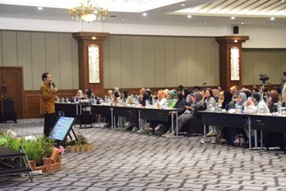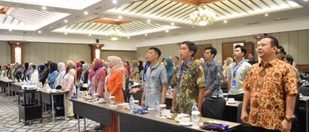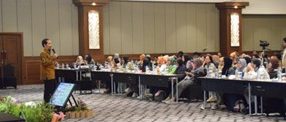
Yogyakarta (20/12), the Islamic Economics Master Program at the Graduate School of Gadjah Mada University held a halal Islamic economics seminar at the Grand Rohan Hotel Yogyakarta. This seminar aims to explore the relationship of halal certification and economic productivity in line with sustainable development goals (SDGs) related to education and economic development.
This seminar invited prominent speakers, each of whom discussed various aspects of halal certification and its implications for the economy. The first speaker, Akhmad Akbar Susamto, Ph.D., presented material on “Turning Halal Certification Challenges into Opportunities.” He emphasized the importance of education for sustainability in the halal industry, highlighting how understanding the certification process can increase productivity and economic development.
Rika Fatimah P.L., Ph.D., presented material on “The Visionary of Rezeki: The Wisdom of Creating an Iconic G2R Tetrapreneur Market for Halal Certified Products.” He highlighted innovative market strategies that can be implemented to promote halal products, emphasizing the importance of the circular economy in ensuring sustainability and long-term economic benefits.
This seminar served as an educational platform and encouraged discussion on the broader implications of halal certification on productivity and economic development. Students and lecturers involved in the discussion shared experiences and insights about related challenges in the halal industry.
The Tetrapreneur Seminar organized by the Islamic Economics MasterProgram at Gadjah Mada University highlighted the important role of education in turning challenges into opportunities in the halal industry. This seminar contributes to the ongoing discourse on how halal certification can drive economic development in Indonesia with a focus on sustainable practices and economic productivity.
Author: Siti Muyasaroh



